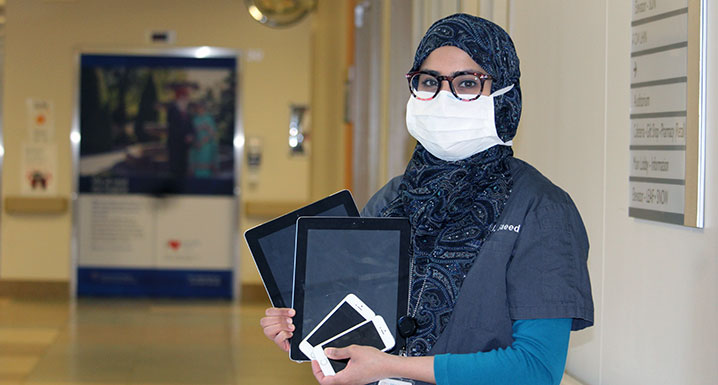
There is much more to a hospital visit than meets the eye. When family members visit their loved ones, they are ‘there’, being present to receive updates, share information, provide personal care, and offer relationship and psychosocial support. They help their loved ones remain connected with their identity and what is most unique and meaningful to them.
During times like these, when hospitals have necessary visitor restrictions in place to protect the health and safety of patients and health care workers, not having those you love in the hospital with you can be difficult. But Osler has worked to make these challenging times easier through its Virtual Visitation Program – a thoughtfully-planned program that is dedicated to keeping patients and families connected.
“We knew from the onset, before visitor restrictions were implemented as part of our health and safety measures, that patient experience had to be a key part of our planning,” said Mary Jane McNally, Osler’s Chief Patient Experience Officer. “Our goal was to ensure that both patients and families felt supported and informed while our health care system managed the task of providing safe, quality care during the pandemic.”
Through Osler’s Virtual Visitation Program, patients who do not have a mobile device are able to get a loaner from unit staff or through a special ‘liaison’, whose role is to directly help connect patients with family members virtually. The liaison role manages the call, holds the device, helps the patient engage with their family and ensures the connection is as meaningful as possible.
Palliative Care Physician, Dr. Humaira Saeed, knows first hand the positive impact virtual visitation has on patients and families, and is one of many Osler health care workers who has been enabling these connections.
“As health care providers, we focus on the medical needs of patients, as well as their psychological and social well-being, and human connection is a very important part of every patient’s care,” said Dr. Saeed. “Facilitating virtual visits is the next best thing when physical contact is not available.”
Dr. Saeed has assisted with countless virtual care visits and has observed how deeply they are valued by patients and their families. “When I see the look on the faces of our patients and their family members, it is so very clear they appreciate being able to see or hear each other,” says Dr. Saeed. “I’ve seen family members celebrate milestones like birthdays and anniversaries during virtual visitation. Celebrations like these can bring a sense of normality to what is a very abnormal situation because of COVID-19,” she adds.
Early on in the pandemic, Dr. Saeed began accepting donations of mobile devices because she anticipated that health care providers would require them for virtual visitation. Since then, she has provided Osler and other health care organizations across the Greater Toronto Area with donated devices. Osler is now using some of them in its Virtual Visitation Program and is providing devices to outpatients in select programs so they can access virtual care.
“It’s incredible to see how quickly our staff and physicians adapted to supporting the patient experience virtually,” said McNally. “A lot of work has been done behind-the-scenes to ensure that we have the resources needed to run this program successfully. With hundreds of virtual touchpoints being facilitated daily, it was important for us to get this right and support our patients and their families during this difficult time.”
Osler has also supported virtual visitation for families – sometimes globally – to say ‘goodbye’ to a loved one at the end of their life.
“We have been honoured to assist in such an intimate experience where we have supported families virtually to participate in a religious or spiritual service or simply a private time to reflect, or listen to their loved one’s favourite music while seeing their family member sometimes for the last time,” said Mary Jane. “These are profound moments of human connection that will live with all of us beyond the complexity and crisis of the moment we live and practice within.”
Osler is also fostering connections between family members and their loved ones in other ways. Skype is enabled on patients’ bedside terminals, family members receive updates from clinical teams regularly and can send e-cards to patients.
“I have been so deeply impressed with ongoing efforts and deep commitment of staff and leaders to support virtual visitation,” said Mary Jane. “Our approach to virtual visitation is truly an example of our Osler Values and our promise to ‘Go Beyond’.

